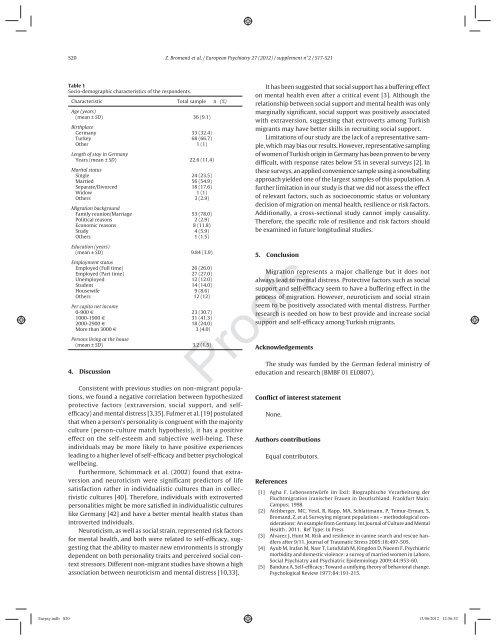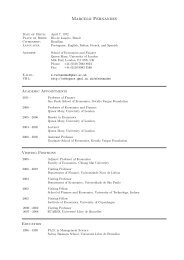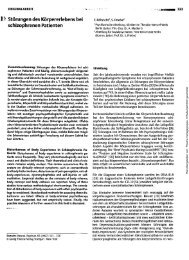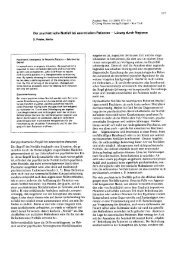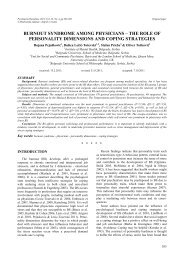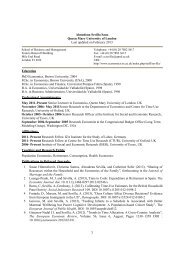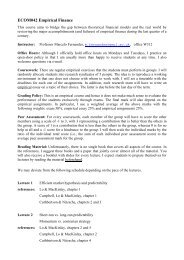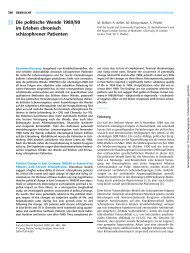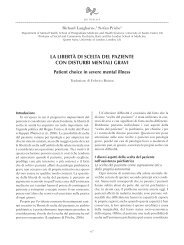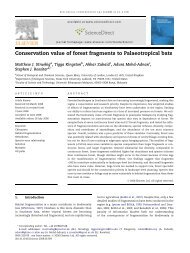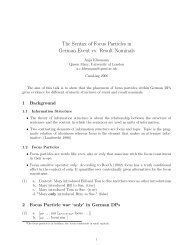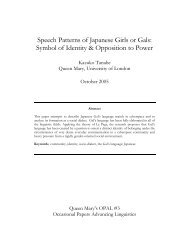Proofs - Personal Webspace for QMUL - Queen Mary, University of ...
Proofs - Personal Webspace for QMUL - Queen Mary, University of ...
Proofs - Personal Webspace for QMUL - Queen Mary, University of ...
Create successful ePaper yourself
Turn your PDF publications into a flip-book with our unique Google optimized e-Paper software.
S20 Z. Bromand et al. / European Psychiatry 27 (2012) / supplement n°2 / S17-S21<br />
Table 1<br />
Socio- demographic characteristics <strong>of</strong> the respondents.<br />
Characteristic Total sample n (%)<br />
Age (years)<br />
(mean ± SD) 36 (9.1)<br />
Birthplace<br />
Germany<br />
Turkey<br />
Other<br />
4. Discussion<br />
33 (32.4)<br />
68 (66.7)<br />
1 (1)<br />
Length <strong>of</strong> stay in Germany<br />
Years (mean ± SD) 22.6 (11.4)<br />
Marital status<br />
Single<br />
Married<br />
Separate/Divorced<br />
Widow<br />
Others<br />
Migration background<br />
Family reunion/Marriage<br />
Political reasons<br />
Economic reasons<br />
Study<br />
Others<br />
24 (23.5)<br />
56 (54.9)<br />
18 (17.6)<br />
1 (1)<br />
3 (2.9)<br />
53 (78.0)<br />
2 (2.9)<br />
8 (11.8)<br />
4 (5.9)<br />
1 (1.5)<br />
Education (years)<br />
(mean ± SD)<br />
Employment status<br />
9.84 (3.9)<br />
Employed (Full time)<br />
26 (26.0)<br />
Employed (Part time)<br />
27 (27.0)<br />
Unemployed<br />
12 (12.0)<br />
Student<br />
14 (14.0)<br />
Housewife<br />
9 (8.6)<br />
Others<br />
Per capita net income<br />
12 (12)<br />
0- 900 €<br />
23 (30.7)<br />
1000- 1900 €<br />
31 (41.3)<br />
2000- 2900 €<br />
18 (24.0)<br />
More than 3000 €<br />
3 (4.0)<br />
Persons living at the house<br />
(mean ± SD) 3.2 (1.5)<br />
Consistent with previous studies on non- migrant populations,<br />
we found a negative correlation between hypothesized<br />
protective factors (extraversion, social support, and selfeffi<br />
cacy) and mental distress [3,35]. Fulmer et al. [19] postulated<br />
that when a person’s personality is congruent with the majority<br />
culture (person- culture match hypothesis), it has a positive<br />
effect on the self- esteem and subjective well- being. These<br />
individuals may be more likely to have positive experiences<br />
leading to a higher level <strong>of</strong> self- effi cacy and better psychological<br />
wellbeing.<br />
Furthermore, Schimmack et al. (2002) found that extraversion<br />
and neuroticism were significant predictors <strong>of</strong> life<br />
satisfaction rather in individualistic cultures than in collectivistic<br />
cultures [40]. There<strong>for</strong>e, individuals with extroverted<br />
personalities might be more satisfi ed in individualistic cultures<br />
like Germany [42] and have a better mental health status than<br />
introverted individuals.<br />
Neuroticism, as well as social strain, represented risk factors<br />
<strong>for</strong> mental health, and both were related to self- effi cacy, suggesting<br />
that the ability to master new environments is strongly<br />
dependent on both personality traits and perceived social context<br />
stressors. Different non- migrant studies have shown a high<br />
association between neuroticism and mental distress [10,33].<br />
It has been suggested that social support has a buffering effect<br />
on mental health even after a critical event [3]. Although the<br />
relationship between social support and mental health was only<br />
marginally signifi cant, social support was positively associated<br />
with extraversion, suggesting that extroverts among Turkish<br />
migrants may have better skills in recruiting social support.<br />
Limitations <strong>of</strong> our study are the lack <strong>of</strong> a representative sample,<br />
which may bias our results. However, representative sampling<br />
<strong>of</strong> women <strong>of</strong> Turkish origin in Germany has been proven to be very<br />
diffi cult, with response rates below 5% in several surveys [2]. In<br />
these surveys, an applied convenience sample using a snowballing<br />
approach yielded one <strong>of</strong> the largest samples <strong>of</strong> this population. A<br />
further limitation in our study is that we did not assess the effect<br />
<strong>of</strong> relevant factors, such as socioeconomic status or voluntary<br />
decision <strong>of</strong> migration on mental health, resilience or risk factors.<br />
Additionally, a cross- sectional study cannot imply causality.<br />
There<strong>for</strong>e, the specifi c role <strong>of</strong> resilience and risk factors should<br />
be examined in future longitudinal studies.<br />
5. Conclusion<br />
Migration represents a major challenge but it does not<br />
always lead to mental distress. Protective factors such as social<br />
support and self- effi cacy seem to have a buffering effect in the<br />
process <strong>of</strong> migration. However, neuroticism and social strain<br />
seem to be positively associated with mental distress. Further<br />
research is needed on how to best provide and increase social<br />
support and self- effi cacy among Turkish migrants.<br />
Acknowledgements<br />
<strong>Pro<strong>of</strong>s</strong><br />
The study was funded by the German federal ministry <strong>of</strong><br />
education and research (BMBF 01 EL0807).<br />
Confl ict <strong>of</strong> interest statement<br />
None.<br />
Authors contributions<br />
Equal contributors.<br />
References<br />
[1] Agha F. Lebensentwürfe im Exil: Biographische Verarbeitung der<br />
Fluchtmigration iranischer Frauen in Deutlschland. Frankfurt Main:<br />
Campus; 1998.<br />
[2] Aichberger, MC, Yesil, R, Rapp, MA, Schlattmann, P, Temur- Erman, S,<br />
Bromand, Z, et al. Surveying migrant populations – methodological considerations:<br />
An example from Germany. Int.Journal <strong>of</strong> Culture and Mental<br />
Health . 2011. Ref Type: In Press<br />
[3] Alvarez J, Hunt M. Risk and resilience in canine search and rescue handlers<br />
after 9/11. Journal <strong>of</strong> Traumatic Stress 2005;18:497- 505.<br />
[4] Ayub M, Irafan M, Nasr T, Lutufulah M, Kingdon D, Naeem F. Psychiatric<br />
morbidity and domestic violence: a survey <strong>of</strong> married women in Lahore.<br />
Social Psychiatry and Psychiatric Epidemiology 2009;44:953- 60.<br />
[5] Bandura A. Self- effi cacy: Toward a unifying theory <strong>of</strong> behavioral change.<br />
Psychological Review 1977;84:191- 215.


